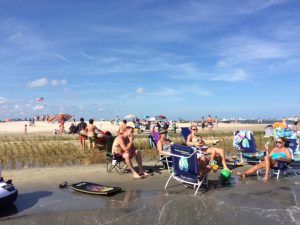
OCEAN CITY — A sandy spit in the Isle of Wight Bay that became a focal point of sorts last summer in a skirmish between public access and habitat protection is officially off limits to recreational boaters with Memorial Day arriving this weekend after the island was turned over to the Department of Natural Resources (DNR) earlier this month.
When the federal Army Corps of Engineers dredged the navigation channels around the resort in 2015, roughly 400,000 cubic yards of sand and dredged material was dedicated to restoring some of the islands in the coastal bays that hadn’t been seen since the 1930s, including a roughly four-acre spit now called Tern Island. Restoring the islands essentially accomplished the dual goals of finding a home for the dredged material while creating crucial habitat for endangered nesting colonial nesting birds in the coastal bays.
However, a conflict of interest quickly arose last summer for the newly-created island. From the beginning, recreational boaters were drawn to the sandy spit in the Isle of Wight Bay and hundreds of boaters dropped anchor and waded ashore all summer, creating a weekend retreat for families and friends. Tern Island’s legacy as a weekend boating hub was solidified last June when a small group of boaters waded ashore with an American flag and bags of concrete and raised Old Glory in a spontaneous act of patriotism. For the rest of the summer, the island was used extensively by recreational boaters for cookouts, horseshoe games and other summer activities, but it was widely believed its days as a weekend retreat were likely numbered.
That came to fruition on May 9 when the state’s Board of Public Works formally conveyed Tern Island to the DNR as part of the Sinepuxent Wildlife Management Area. As a result, Tern Island is now officially closed to the public from April 1 to Sept. 15, when the colonial migratory birds are nesting. Essentially the closure dates coincide with the height of the recreational boating season in the resort. The island and other similarly protected islands in the coastal bays are now posted with signs along the shoreline alerting boaters the areas are off limits.
On Monday, DNR officials and their state and local partners formally announced the island’s closure with a press conference at the Greater Ocean City Chamber of Commerce facility in West Ocean City. DNR officials said the island would be off limits to recreational boaters in the interest of protecting essential habitat for colonial nesting birds, including black skimmers, royal terns and common terns.
In the last decade-plus, the Black Skimmer population in the coastal bays Important Bird Area (IBA) has declined from 87 pairs to just six pairs confined to a tiny fragment of island where their nests face a constant threat of being washed away. Similarly, common terns have declined by 86 percent and royal terns have declined by 60 percent.
All three species are now listed as endangered in Maryland and the bays behind Ocean City and Assateague are the only areas in the state where they breed. DNR Deputy Secretary Joanne Throwe said on Monday the intent all along was to use the dredged material to create the islands and restore the critical habitat and there was never any intention of opening the new spaces for recreation.
“This is for the birds,” she said. “This is what it’s all about. The dredging gave us a wonderful opportunity to restore these islands for colonial nesting birds. We can have all of the things we love on vacation, but we need to preserve conservation areas for our habitat.”
DNR ecologist David Brinker said there were ample opportunities for recreational boaters in and around the coastal bays without disturbing the critical habitat of the colonial nesting birds.
“Most recently, there were 250 breeding pairs,” he said. “Lately, we’ve been lucky to get 15. We have to have habitat for these birds. When the birds were disturbed too much, they didn’t do so well. There is no other place in Maryland for these birds, so when we’re asked why we’re closing off the island, the answer is it is the only place for these birds and there are plenty of other areas for recreation.”
Former Maryland Coastal Bays Program Executive Director Dave Wilson, speaking on behalf of Audubon-Maryland, said he understood the desire of the boating community to access the island, but pointed out birding also has a significant economic impact in the state.
“We understand there is an economic component for recreational boating, but in trying to keep boaters off the island, there is a big economic engine for us as well,” he said. “Nationwide, birding represents a $40 billion a year industry and in Maryland, the annual total is $300 million.”
From an enforcement standpoint, the Maryland Natural Resources Police (NRP) will approach the changing situation with the island with education and outreach, but there are some enforcement tools in the tool box if the need arises.
“Our goal is to continue the theme of education,” said NRP Area Commander Lieutenant Art Windemuth. “Our goal is to educate and bring awareness about the importance of the island for the nesting birds. Around 99 percent understand that and the work that goes into it. In the rare instances that they don’t, we will take enforcement action. We don’t expect that and we’re hopeful we’ll get a high rate of compliance.”
Windemuth said the NRP will be patrolling Tern Island and similarly situated islands in the resort area during the summer season, but hopes to curtail enforcement with other outreach methods.
“We’re going to be out there,” he said. “Again, we hope to educate and in most cases we’ll probably tell people to please move along and away from the island. If there are repeat offenders, we will issue written warnings or citations, and there is a maximum fine of $1,500, but we hope that is a measure of last resort.”

